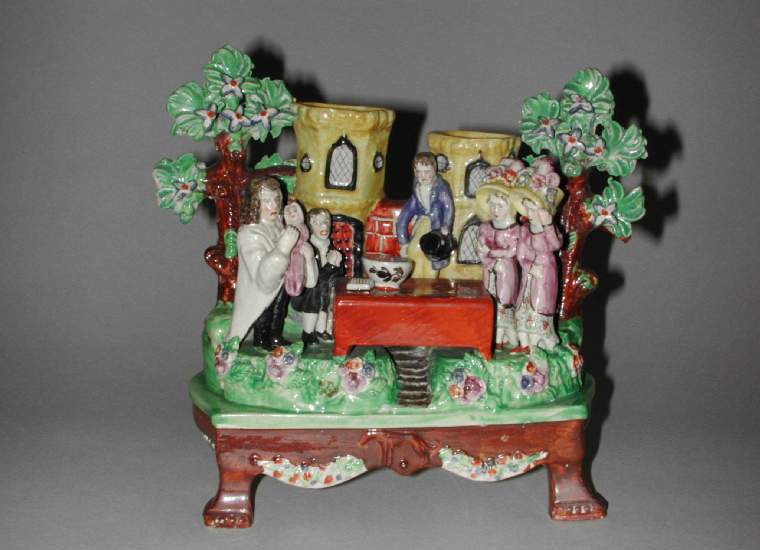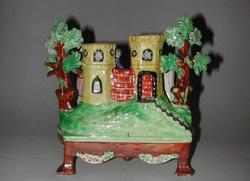Current Location: In storage
Titles
A Christening
Maker(s)
Production:
Unidentified Pottery
Entities
Categories
Description
Earthenware table figure group, moulded and modelled, lead glazed and painted with polychrome enamels.
Figure group of a christening. A clergyman holds a pink-gowned baby; a clerk stands by his side. Facing them, across a table, are two godmothers wearing flowered dresses, mauve cloaks and large yellow bonnets trimmed with flowers and feathers; one of them holds her hand to her bonnet, the other has crossed arms. At the back is the godfather with a blue coat, holding a black hat in his hand. There is a bowl and a book on the table.
The scene is set against two trees flanking a twin-turreted castle; the figures stand on a flowered, grassy mound; grey steps run up from the centre front and round the castle. It sits on a four-legged table base, painted brown, with a green top, and decorated with polychrome swags and a small brown moulded dog centre front. The back is painted, it is almost flat but with the backs of the turrets and steps moulded in. The underside of the base is recessed and flat.
Notes
History note: Captain Reynolds Collection, London; sold to Messrs Gill and Reigate; Mr Stoner, London, from whom purchased in 1910 by Dr J.W.L. Glaisher, Trinity College, Cambridge. Dr Glaisher paid £125 for this and fourteen other pieces, as part of a purchase of 35 figures and figure groups.
Legal notes
Dr J.W.L.Glaisher Bequest
Measurements and weight
Height: 21.2 cm
Width: 26.6 cm
Acquisition and important dates
Method of acquisition: Bequeathed
(1928)
by
Glaisher, J. W. L., Dr
Dating
19th Century, first half
Circa
1825
CE
-
Circa
1835
CE
Note
Earthenware figure groups were popular from around 1810, although the earliest examples date from nearly a century earlier. A cheaper alternative to porcelain figures, they were often produced by small potteries; very few are marked. Classical or literary subjects were frequently copied from porcelain examples, but potters increasingly turned to scenes from everyday life and topical events. These early figure groups are often complex, including modelled and moulded parts and applied decoration; the backs, though flat, are decorated; bocage (stylised foliage) is common on groups from c.1810-20. However, as demand increased, processes were streamlined to allow mass production and by c.1835 the earlier, relatively costly, methods had largely given way to three-part press-moulding.
Table groups, standing on four or six short legs, were made from c.1825-35; similar features suggest they were made by just a few makers. They have in the past been attributed to Obadaiah Sherratt of Burslem, but without clear evidence; they were probably made by a number of figure makers. However, similarities in the shape and colouring of this table base, the moulded dog ‘mark’ on the front and the bocage suggest this table base group was made by the same potter as two others in the Fitzwilliam Collection.
This is one of a pair of closely related figure groups, representing a marriage at Gretna Green and a christening; both are represented in the collection. Both scenes were also made, with similar composition, by other potters. But as Dr Glaisher notes, here: ‘the modelling is very good, and the colours are peculiarly good and brilliant, and the details are carefully attended to’. The hollow turrets are designed to hold spills, used to light the fire.
Components of the work
Decoration
composed of
enamels
lead-glaze
Parts
Materials used in production
White earthenware
Techniques used in production
Moulded
: Earthenware, moulded and modelled, lead glazed and painted with polychrome enamels.
References and bibliographic entries
Identification numbers
Accession number: C.963A-1928
Primary reference Number: 76462
Stable URI
Audit data
Created: Saturday 6 August 2011
Updated: Monday 29 April 2024
Last processed: Tuesday 15 July 2025
Associated departments & institutions
Owner or interested party:
The Fitzwilliam Museum
Associated department:
Applied Arts





